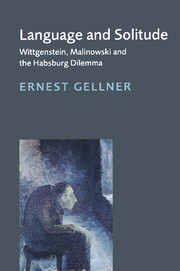Book contents
- Frontmatter
- Contents
- Preface
- Foreword
- Part I The Habsburg dilemma
- Part II Wittgenstein
- 10 The loneliness of the long-distance empiricist
- 11 The poem to solitude, or: confessions of a transcendental ego who is also a Viennese Jew
- 12 Ego and language
- 13 The world as solitary vice
- 14 The mystical
- 15 The central proposition of the Tractatus: world without culture
- 16 Wittgenstein mark 2
- 17 Tertium non datur
- 18 Joint escape
- 19 Janik and Toulmin: a critique
- 20 The case of the disappearing self
- 21 Pariah communalism
- 22 Iron cage Kafka-style
- Part III Malinowski
- Part IV Influences
- Part V Conclusions
- General bibliography
- Bibliographies of Ernest Gellner's writings on Wittgenstein, Malinowski, and nationalism
- Index
14 - The mystical
Published online by Cambridge University Press: 05 March 2010
- Frontmatter
- Contents
- Preface
- Foreword
- Part I The Habsburg dilemma
- Part II Wittgenstein
- 10 The loneliness of the long-distance empiricist
- 11 The poem to solitude, or: confessions of a transcendental ego who is also a Viennese Jew
- 12 Ego and language
- 13 The world as solitary vice
- 14 The mystical
- 15 The central proposition of the Tractatus: world without culture
- 16 Wittgenstein mark 2
- 17 Tertium non datur
- 18 Joint escape
- 19 Janik and Toulmin: a critique
- 20 The case of the disappearing self
- 21 Pariah communalism
- 22 Iron cage Kafka-style
- Part III Malinowski
- Part IV Influences
- Part V Conclusions
- General bibliography
- Bibliographies of Ernest Gellner's writings on Wittgenstein, Malinowski, and nationalism
- Index
Summary
The above formula, though it does capture some of the truth about the Tractatus, does not capture all of it. The idea that we apprehend the world through the logical equipment enshrined in set theory, which had such a remarkable hold over the thinking of the young Wittgenstein, did not dominate it without qualification. For one thing, as we have seen, the dreariness of language was grafted on to the solitude of the mind confronting the world. But there was also a further theme.
Wittgenstein also had a strong religious or mystical sense, which is very prominent in the later passages of the Tractatus. The notation of set theory may dominate and circumscribe what can be said but, for all that, what can be said does not exhaust our mental life. On the contrary, the dreariness of what can be said is highlighted by the luminous quality of that which cannot be said.
Not how the world is, but that it is at all, is part of the mystical. The mystical escapes the limits imposed by set theory and the calculus of propositions. In other words it escapes the atomism; a sense of totality is allowed provided it is not articulated, or provided it is not articulated legitimately (but, in true Wittgensteinian style, it is affirmed, decreed indubitable, and then withdrawn from the realm of the sayable). The ineffable, and this is very important, escapes neither Wittgenstein's autism nor his tacitly assumed universalism. The unsayable, like the sayable, observes the assumption that minds, though utterly isolated, resemble each other in all important features.
Information
- Type
- Chapter
- Information
- Language and SolitudeWittgenstein, Malinowski and the Habsburg Dilemma, pp. 65 - 67Publisher: Cambridge University PressPrint publication year: 1998
